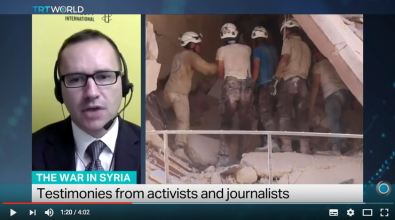27th January 2017
 Amnesty International Infographic by Prof. Tim Anderson
Amnesty International Infographic by Prof. Tim Anderson
Most of us living outside Syria know very little of the country or its recent history. What we think we know comes via the media. Information that comes with the endorsement of an organisation like Amnesty International we may tend to assume is reliable. Certainly, I always trusted Amnesty International implicitly, believing I understood and shared its moral commitments.
As a decades-long supporter, I never thought to check the reliability of its reporting. Only on seeing the organisation last year relaying messages from the infamous White Helmets did questions arise for me.[1] Having since discovered a problem about the witness testimonies provided by Doctors Without Borders (MSF), I felt a need to look more closely at Amnesty International’s reporting.[2] Amnesty had been influential in forming public moral judgements about the rights and wrongs of the war in Syria.
What if Amnesty’s reporting on the situation in Syria was based on something other than verified evidence?[3] What if misleading reports were instrumental in fuelling military conflicts that might otherwise have been more contained, or even avoided?
Amnesty International first alleged war crimes in Syria, against the government of President Bashar Al-Assad, in June 2012.[4] If a war crime involves a breach of the laws of war, and application of those laws presupposes a war, it is relevant to know how long the Syrian government had been at war, assuming it was. The UN referred to a ‘situation close to civil war’ in December 2011.[5] Amnesty International’s war crimes in Syria were therefore reported on the basis of evidence that would have been gathered, analysed, written up, checked, approved and published within six months.[6] That is astonishingly – and worryingly – quick.
The report does not detail its research methods, but a press release quotes at length, and exclusively, the words of Donatella Rovera who ‘spent several weeks investigating human rights violations in northern Syria.’  As far as I can tell, the fresh evidence advertised in the report was gathered through conversations and tours Rovera had in those weeks.[7] Her report mentions that Amnesty International ‘had not been able to conduct research on the ground in Syria’.[8]
As far as I can tell, the fresh evidence advertised in the report was gathered through conversations and tours Rovera had in those weeks.[7] Her report mentions that Amnesty International ‘had not been able to conduct research on the ground in Syria’.[8]
I am no lawyer, but I find it inconceivable that allegations of war crimes made on this basis would be taken seriously. Rovera herself was later to speak of problems with the investigation in Syria: in a reflective article published two years afterwards,[9] she gives examples of both material evidence and witness statements that had misled the investigation.[10] Such reservations did not appear on Amnesty’s website; I am not aware of Amnesty having relayed any caveats about the report, nor of its reviewing the war crimes allegations. What I find of greater concern, though, given that accusations of crimes already committed can in due course be tried, is that Amnesty also did not temper its calls for prospective action. On the contrary.
In support of its surprisingly quick and decisive stance on intervention, Amnesty International was also accusing the Syrian government of crimes against humanity. Already before Deadly Reprisals, the report Deadly Detention had alleged these. Such allegations can have grave implications because they can be taken as warrant for armed intervention.[11] Whereas war crimes do not occur unless there is a war, crimes against humanity can be considered a justification for going to war. And in war, atrocities can occur that would otherwise not have occurred.
I find this thought deeply troubling, particularly as a supporter of Amnesty International at the time it called for action, the foreseeable consequences of which included fighting and possible war crimes, by whomsoever committed, that might otherwise never have been. Personally, I cannot quite escape the thought that in willing the means to an end one also shares some responsibility for their unintended consequences.[12]
If Amnesty International considered the moral risk of indirect complicity in creating war crimes a lesser one than keeping silent about what it believed it had found in Syria, then it must have had very great confidence in the findings. Was that confidence justified?
CONTINUE READING AT TIM HAYWARD’S BLOG
Featured image is by Cory Morningstar of Wrong Kind of Green



Pingback: #StopWar on #Syria Articles – All About Being Human (award-free zone)
Thanks again. I’m new at social media. I only got a computer last year, twit/fbook Dec last and still no smart phone. Use @jamesgraham521 and /jamesgraham521 if you like. I’m from Clydebank/Red Clydeside, Scotland. I help out at clydebanktuc.org
LikeLike